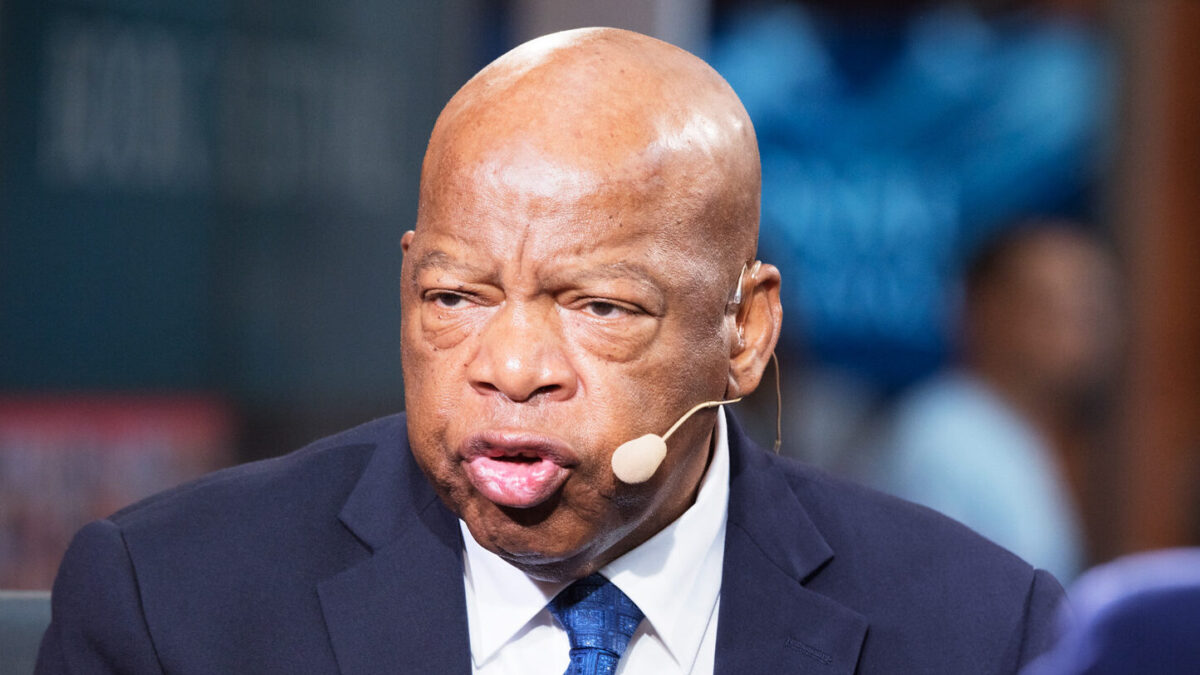Democrats want to strip states and local jurisdictions of their control over elections and hand power to President Joe Biden’s weaponized Department of Justice and its left-wing allies to override election integrity laws.
Sens. Raphael Warnock, Dick Durbin, and Chuck Schumer reintroduced HR 14, dubbed the John R. Lewis Voting Rights Advancement Act, on March 1, more than two years after it failed to make headway in the Senate after being passed by the House in 2021.
If the bill were to pass, it would enable the Department of Justice to “intervene anywhere in the country to overrule local or state authorities whenever the left alleges that changes in the laws could theoretically disadvantage minority voters,” as Jonathan Tobin explained in these pages in 2022.
Shelby County v. Holder
The legislation is a power grab meant to circumvent the Supreme Court’s 2013 decision that restrained the federal government’s overreach into elections.
In 1965, a section of the Voting Rights Act barred certain jurisdictions — “states or political subdivisions that maintained tests or devices as prerequisites to voting and had low voter registration or turnout” at the time — from making changes to their voting laws without federal approval or “preclearance.” Despite an initial sunset of five years, Congress continued to reauthorize the provision, but never updated the 1960s-era formula by which the law determined which jurisdictions were subject to federal scrutiny.
In Shelby County v. Holder, the Supreme Court found that the formula was outdated and ruled it “can no longer be used as a basis for subjecting jurisdictions” to the requirement that the federal government preclear any new voting laws.
Since the Voting Rights Act was passed in 1965, “disparities in voter registration and turnout due to race were erased,” the court noted, “and yet [Congress] ignores these developments.”
The Court ruled, as Heritage Foundation senior legal fellow Hans von Spakovsky explained, that “Congress would … have to show that there were still ‘blatantly discriminatory evasions of federal decrees,’ ‘voting discrimination on a pervasive scale,’ or ‘flagrant’ or ‘rampant’ voting discrimination,” something it failed to do.
Despite hysterics from the left, the 2013 ruling did not appear to hamper minority voter turnout. Census Bureau data shows the 2020 election saw the “highest voter turnout in the 21st century.” Black voters had a 3 percent increase in turnout compared to 60 percent in 2016. Hispanic voter turnout also increased from 48 percent in 2016 to 54 percent in 2020.
Democrats want you to believe the court’s decision left a need for recourse by the federal government to address potential voting discrimination. But Section 2 bans voting discrimination on the basis of things like race and color while Section 3 says a court can oversee a jurisdiction if it’s determined oversight is necessary to comply with the 14th and 15th Amendments.
As von Spakovsky explained, HR 14 would “reimpose” an even stricter formula that would give the DOJ final say over states’ voting laws for 10 years “if the attorney general determined that ten ‘voting-rights violations’ occurred during a 25-year period, even if the state was responsible for only one of them and the rest were committed by city or county governments over which the state had no authority.”
“A claimed discriminatory effect based purely on a statistical disparity would count as a violation,” he noted.
HR 14 Would Empower the DOJ to Make War on Voter ID
Specifically, passing a voter ID law would “automatically trigger preclearance requirements,” subjecting a jurisdiction to DOJ scrutiny.
The Biden DOJ has made no secret of its views on voter ID. Attorney General Merrick Garland boasted earlier this week of the department’s efforts to challenge “voter ID requirements,” and the DOJ sued Arizona for requiring people prove their citizenship in order to vote by mail or in presidential elections.
Often, the DOJ works with left-wing groups in its efforts against voter ID laws. The department was scolded in 2012 after worked alongside the ACLU to object to a South Carolina voter ID law, as von Spakovsky pointed out.
The state had a voter ID law in place since the late 1980s that permitted individuals without a photo ID to vote so long as they had a non-photo voter registration card. The new law stipulated voters with the non-photo voter registration card would have to sign a statement at the poll listing why they haven’t obtained a photo ID to vote before being allowed to cast a ballot. The law expanded the types of eligible photo IDs and created new photo registration cards free of charge.
In an opinion penned by then-Circuit Judge Brett Kavanaugh, a federal court found the law was “not enacted for a discriminatory purpose.”
Another federal court chastised the department in a 1995 redistricting case for its “use of partisan advocates in its dealings with state officials and for its close cooperation with the ACLU’s vigorous advocacy of minority district maximization.”
And let’s not forget when the ACLU, the Biden administration, and other groups sued Georgia over its Election Integrity Act of 2021, alleging its provisions (including voter ID requirements) would prevent black Georgians from voting.
It did nothing of the sort, and the Peach State saw a record-breaking turnout during early voting for the 2022 midterms, as The Washington Post reported. Approximately 800,000 Georgians cast an early, in-person vote, “more than three times the number in 2018, and higher even than in 2020, a presidential year.” Then-70-year-old Patsy Reid told the outlet she heard it was going to be more difficult to vote because of Republicans but instead found herself “treated with the respect that I knew I deserved as an American citizen.” Reid said she encountered no problems voting.
This Isn’t Democrats’ First Attempted Elections Power Grab
HR 14 is the junior version of another federal elections takeover bill, HR 1, which Democrats pushed in 2021.
Going even further than HR 14, HR 1 sought to mandate mail-in ballots and delay final results by eradicating legal deadlines for mail-in-ballots, among other things, as my colleague Joy Pullmann explained. Other provisions included dropping meaningful voter ID requirements and preventing the clean-up of voter rolls.
[READ: 15 Insane Things In Democrats’ H.R. 1 Bill To Corrupt Elections Forever]
That legislation would have defied “the Elections Clause of Article 1 of the Constitution and the Electors Clause of Article II,” warned a letter signed by several Republican attorneys general back in 2021. Those constitutional provisions ensure that “States have principal — and with presidential elections, exclusive — responsibility to safeguard the manner of holding elections,” the letter explained.








